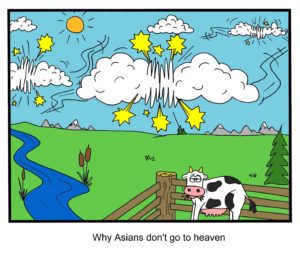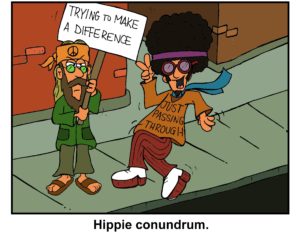Back in 2006, Al Gore told the world about climate change. The planet was warming and it was all our fault. He said both nature and man put up greenhouse gases—and though nature puts up more, it brings down its fair share. What man puts up, stays up. So the idea was for man to emit less, until we get to none.
Citizens of the world united and along with industry and government, we began to make change. New methods of generation were invented and we became creative in lessening our needs. So how are we doing at controlling this mess? And where’s the report on getting us green?
People generated greenhouse gases (GHGs) come in two forms: making energy and using it. Making energy is the process of generating electricity and things like exploring for oil. Using it includes light bulbs, transportation, and heat.
Electricity
Other than veal parmesan, electricity has to be the greatest invention yet. Unfortunately, it’s also a major cause of GHGs. Here’s where your power comes from:
- coal-fired plants
- natural gas fired plants
- nuclear
- hydro (e.g., Quebec’s Churchill Falls)
- wind, solar, biomass, geothermal, and other
Coal is dirtiest. Natural gas is 50-60% better, but still not green. Nuclear is green, but in decline. So only the bottom two are viable non-emitters. Hydro is great, but can be hard to get to. Wind is now real (no joke), solar is selling, and some of the others are showing results.
To make dirty better, coal-fired plants are being replaced by natural gas and carbon recapture is being developed for both. Canada is number two for hydro and we’ve been at it a while. In fact, we get 60% of our power this way. Denmark generates 42% of its electricity from wind. And solar is being used for remote locations and in much of the third world.
In total: coal is being phased out and much more power is coming from green.
Oil and gas
Other than the above, natural gas is used for heating homes and olive oil isn’t what drives your car. So though Canada can boast about power, we still have long winters and travel pretty far.
Our fuel industry has taken flack over how they capture their goods, especially in Fort Mac. But extraction methods are now better and the oil sands is a different place than when Leonardo first visited (causing such fuss), but it’s not the same as digging a hole. In terms of regular production, lots of improvements have been made and the future looks bright.
Long story short: whether for power generation or personal use, the harvesting and burning of fossil fuels is getting cleaner.
Consumption
We’ve also been working on use. Between fancy light bulbs, putting on a sweater, and taking the rickshaw, we’re actually gearing down. Over the past 10 years, energy use in the first world has remained flat, despite population growth. This means the increase in people is being offset by per capita reductions, and there are some really cool stories. For example, 39% of Norway’s cars are now electric (and this figure will be 100% in seven more years).
Closer to home, Edmonton just bought 40 electric buses and three provinces (ON, QC, and BC) have incentives to buy green cars (hybrid or electric). Insulation in new homes has been improved greatly and every furnace and appliance is much more efficient. So conservation is up.
And it’s no secret higher density areas were the quickest to act. Why? Because though a truck in Iowa spews the same GHG as a truck in LA, the one in LA causes pollution you can see. That’s why many supporters didn’t need science to believe—they were sold by the smog.
Carbon taxation is another way to entice people into doing more. It raises the price of home heating and gasoline so you’ll turn down the thermostat and get a smaller house. Then maybe use transit or buy more efficient wheels. It worked in BC because they lowered provincial tax at the same time (so it was a shift). In Australia they made it an additional cost and voters revolted. Tossing the party and policy after only two years.
Deniers
The media still hosts one-sided debates over the validity of the cause. Crusaders say it’s a crisis while doubters call it a hoax. But that’s not what’s happening on the street. Regular people are never so radical. Most of us know it’s best to leave the campsite clean and that air quality counts.
And for the most part, the fight appears to be dead. It never made its way into boardrooms and the most maligned players are leading the charge. Every country is sensitive to global warming and each company has a plan. So what we’re really talking about is speed.
Most of this is normal. Whenever we face change there is one group in favour and another to resist. Modern day battles are louder because more people get involved, but no matter what delusion your party has you under, green energy is happening and we’ll get there when we can.
Summary
Understanding energy isn’t easy, but it comes down to electricity, transportation, and heat. One plan is to get all power from clean sources and then use it for everything. And in the short term, use fossil fuels the best we can. Here’s how we’re doing:
- Wind is now real. The US gets 6% of its power this way, up from zero just twenty years ago. In Germany it’s 13%, India 10%, and you already know about Denmark (42—going to 80 in a few years).
- Electric vehicles are also real. Not only in Norway, but now that technology is improving it’s sure to succeed. Already a number of countries have indicated they’re going this way and if Edmonton can buy these sorts of buses, it’s gotta be real.
- And solar is being put into the craziest of places. Why? Because powerlines don’t run everywhere. So if it’s a crew in the boonies or some guy in a hut, you need a TV. And believe it or not, Italy is leading the way with 7% of its power coming from sun.
Of course, lots of this gets subsidized and many projects have failed, but that’s normal for new innovation. You don’t hit a home run your first time out. So solar and wind simply needed some breaks (no different than older resources). And remember, hydro has always been good.
Bottom line: the decision has been made and we’re headed for green. Leaders aren’t taking us back to horse and carriage, they just want lower emissions. And though some saw the election of Trump as a major setback, he didn’t tell Tesla or GE (because there’s no stopping this).
One day we might invent a spaceship that goes up with a carbon broom to clean, but until then we’re watching the planet. Industry and government make up the plan, our job is to support it. And if you’re still really confused, pretend we’re fighting air pollution—with a twist.
Note: A shout out goes to people who bought the first generation hybrids—those things were ugly. And how about all the potheads in Holland? Who would have thought they’d come up with such an invention?






